this too
Thursday, March 31, 2005
La Laitière
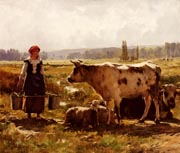
Cows have been on my mind, put there by Lorianne, whose blog, whose writing, I admire enormously. She visited some cows and wryly depicted herself photographing them, lining them up as a blog subject: Nothing says "city slicker" like the act of taking a camera into a dairy barn. Instantly you are branded as a sightseer, someone enchanted with the novelty of large animals… Only upper-class poets consider milking to be a pastoral pursuit…
Indeed, how can the city-dweller have any relationship with cows that isn’t contrived and self-conscious?
Well, I remember… I remember resting my head on the warm flank of a cow I was milking, and feeling (oh dear, how do I put this without being ultra-twee?) calm and contented in the midst of all the fears that assailed my twenty-one-year-old life - growing estrangement from my family, dread of academic failure, an impossible love, what was I going to do/be? I remember this and smile at myself and set myself up for ridicule, but it’s such a lovely memory.
It was the Easter holiday before my university finals. I visited friends in France, where I’d spent my language-student’s ‘year abroad’ the previous year, went with them to Jean-Marie’s parents’ village in the Ardèche. A golden place of old stones and sunbaked mud and buzzards wheeling in wide skies. A tiny place, a few tumbledown houses around a square. A lost place, poor and crumbling, almost all the paysans gone to work in factories, only the feckless and the none-too-bright not rushing off to better themselves.
Just the one house still inhabited in the traditional way by family upstairs and cows below. A beaming, sleazy family, still working their land, tending their few vines, milking their two cows, scratching a poor living and I fear too often passing out under the apple trees drunk on their homemade wine and spirits. Not a romantic decay. Growing poverty. Premature ageing. Fear of the authorities – all too aware that the two little grubby sparrow daughters were seen as deprived and potentially at risk. Alcoholism is alcoholism, even if passing out in the orchard is a lot less dangerous and dreadful than passing out on a city street. But still, a defiant love of the land and of a dying way of life.
I never opened my books. Walked in the countryside until I was shattered, sat on the war memorial in the little square watching my friends’ kids rush about and when they were tired sat them there beside me and told them stories in the quiet dusk. And I hung around in the cowshed until Pierre offered to show me how to milk the cows. My friends tittered, but I said yes, felt like I’d stepped out of my life and floated into somewhere different, a reprieve from being me. For once I brought no tension, no learner’s anxiety, sat down and did it, found the rhythm easily.
Every day I got up early, drank strong, viscous black coffee and a shot of rough spirits (good grief) and milked one of the cows, while Pierre milked the other. A gap-toothed grin: good lord, she likes it, that’s a rare thing these days. You should marry a paysan. No irony, but genuine surprise and gratification. No irony on my side either.
It was a good holiday, much needed, never forgotten.

Cows have been on my mind, put there by Lorianne, whose blog, whose writing, I admire enormously. She visited some cows and wryly depicted herself photographing them, lining them up as a blog subject: Nothing says "city slicker" like the act of taking a camera into a dairy barn. Instantly you are branded as a sightseer, someone enchanted with the novelty of large animals… Only upper-class poets consider milking to be a pastoral pursuit…
Indeed, how can the city-dweller have any relationship with cows that isn’t contrived and self-conscious?
Well, I remember… I remember resting my head on the warm flank of a cow I was milking, and feeling (oh dear, how do I put this without being ultra-twee?) calm and contented in the midst of all the fears that assailed my twenty-one-year-old life - growing estrangement from my family, dread of academic failure, an impossible love, what was I going to do/be? I remember this and smile at myself and set myself up for ridicule, but it’s such a lovely memory.
It was the Easter holiday before my university finals. I visited friends in France, where I’d spent my language-student’s ‘year abroad’ the previous year, went with them to Jean-Marie’s parents’ village in the Ardèche. A golden place of old stones and sunbaked mud and buzzards wheeling in wide skies. A tiny place, a few tumbledown houses around a square. A lost place, poor and crumbling, almost all the paysans gone to work in factories, only the feckless and the none-too-bright not rushing off to better themselves.
Just the one house still inhabited in the traditional way by family upstairs and cows below. A beaming, sleazy family, still working their land, tending their few vines, milking their two cows, scratching a poor living and I fear too often passing out under the apple trees drunk on their homemade wine and spirits. Not a romantic decay. Growing poverty. Premature ageing. Fear of the authorities – all too aware that the two little grubby sparrow daughters were seen as deprived and potentially at risk. Alcoholism is alcoholism, even if passing out in the orchard is a lot less dangerous and dreadful than passing out on a city street. But still, a defiant love of the land and of a dying way of life.
I never opened my books. Walked in the countryside until I was shattered, sat on the war memorial in the little square watching my friends’ kids rush about and when they were tired sat them there beside me and told them stories in the quiet dusk. And I hung around in the cowshed until Pierre offered to show me how to milk the cows. My friends tittered, but I said yes, felt like I’d stepped out of my life and floated into somewhere different, a reprieve from being me. For once I brought no tension, no learner’s anxiety, sat down and did it, found the rhythm easily.
Every day I got up early, drank strong, viscous black coffee and a shot of rough spirits (good grief) and milked one of the cows, while Pierre milked the other. A gap-toothed grin: good lord, she likes it, that’s a rare thing these days. You should marry a paysan. No irony, but genuine surprise and gratification. No irony on my side either.
It was a good holiday, much needed, never forgotten.
Tuesday, March 29, 2005
Escaping into fiction
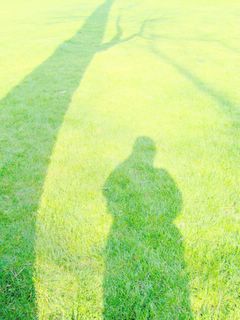
As a child, my absolutely favourite thing was to curl up undisturbed with a good novel. This was still true well into adulthood, though losing myself in a powerful film began to run it a close second. I stoutly defended this choice against parental disapproval and later the equally scathing, if less moralistically motivated, disapproval of friends. I held it tenderly to myself in defiance of an intellectual boyfriend who admitted no merit in any narrative which didn’t subvert itself.
It served me well, I suppose, saved me many a time from terminal wretchedness or boredom. I’d still defend the capacity for total surrender to imagination as precious and life-enhancing and I hope I never completely lose the ability to disappear into fantasy-land.
At some point, though, it ceased to be the height of my desires. At some moment, I suppose, in my complicated and usually, but not quite always, futile grappling with life, I squeezed enough pleasure and satisfaction from the real – whatever that is - to thenceforth want that more.
I look back now and see my childish commitment to losing myself in fiction as, yes, the sign of a strong and vivid imagination, but also the sign of an unhappy family life from which I desperately needed to escape. If fiction no longer serves me quite as well, this is because my need to escape is no longer so consuming.
Still, it leaves me at a loss sometimes. It’s still my first instinct, when life is hard, to shut myself in for a whole evening – better still a whole day, a whole weekend – with a fat novel. It does still work on occasion. Just recently, I got through all of Trollope’s Palliser novels and thus through an exquisitely horrible time at work.
Sometimes, though, it doesn’t work at all; the chosen volume becomes identified with the purpose it didn’t serve and I know that’s one I’ll never finish.
More often, it works a bit, creates a blessed bit of space at least, by taking my mental and emotional energy elsewhere for a few hours. But blot out everything? Make me happy, really happy? No, it takes more than a story.
Meditation has played a part here, I think. Once you’ve tasted being a bit more present, absence doesn’t have the same appeal.

As a child, my absolutely favourite thing was to curl up undisturbed with a good novel. This was still true well into adulthood, though losing myself in a powerful film began to run it a close second. I stoutly defended this choice against parental disapproval and later the equally scathing, if less moralistically motivated, disapproval of friends. I held it tenderly to myself in defiance of an intellectual boyfriend who admitted no merit in any narrative which didn’t subvert itself.
It served me well, I suppose, saved me many a time from terminal wretchedness or boredom. I’d still defend the capacity for total surrender to imagination as precious and life-enhancing and I hope I never completely lose the ability to disappear into fantasy-land.
At some point, though, it ceased to be the height of my desires. At some moment, I suppose, in my complicated and usually, but not quite always, futile grappling with life, I squeezed enough pleasure and satisfaction from the real – whatever that is - to thenceforth want that more.
I look back now and see my childish commitment to losing myself in fiction as, yes, the sign of a strong and vivid imagination, but also the sign of an unhappy family life from which I desperately needed to escape. If fiction no longer serves me quite as well, this is because my need to escape is no longer so consuming.
Still, it leaves me at a loss sometimes. It’s still my first instinct, when life is hard, to shut myself in for a whole evening – better still a whole day, a whole weekend – with a fat novel. It does still work on occasion. Just recently, I got through all of Trollope’s Palliser novels and thus through an exquisitely horrible time at work.
Sometimes, though, it doesn’t work at all; the chosen volume becomes identified with the purpose it didn’t serve and I know that’s one I’ll never finish.
More often, it works a bit, creates a blessed bit of space at least, by taking my mental and emotional energy elsewhere for a few hours. But blot out everything? Make me happy, really happy? No, it takes more than a story.
Meditation has played a part here, I think. Once you’ve tasted being a bit more present, absence doesn’t have the same appeal.
Rosemary
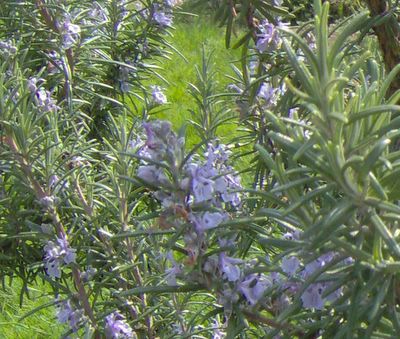
Lots of rosemary bushes in flower around where I live. As I pass, I pull off new leaves and chew them. As I put the camera on macro and push it into the bush, waves of scent waft towards me.
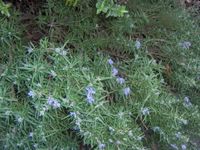
In a café in St-Rémy-de-Provence, I ask for an infusion and get a tumbler of hot water with a sprig of rosemary in it. Stare and poke, watch the water slowly change to pale amber, take the twig out and drink it down – lovely. Rosemary becomes a tea.
Later it becomes my regular breakfast tea – a gentler wake-up substitute for coffee.
And as it bursts into new growth, all these healing properties are there in the strong, subtle blues and greens, the smooth, resilient texture of the new shoots, the deep, oily aroma.
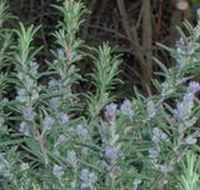

Lots of rosemary bushes in flower around where I live. As I pass, I pull off new leaves and chew them. As I put the camera on macro and push it into the bush, waves of scent waft towards me.

In a café in St-Rémy-de-Provence, I ask for an infusion and get a tumbler of hot water with a sprig of rosemary in it. Stare and poke, watch the water slowly change to pale amber, take the twig out and drink it down – lovely. Rosemary becomes a tea.
Later it becomes my regular breakfast tea – a gentler wake-up substitute for coffee.
Later still, having learned a little of herbal medicine, I know it’s so much more: antiseptic, antiviral, soothing and stimulating, astringent, healing; that it helps my headaches and poor digestion.
And as it bursts into new growth, all these healing properties are there in the strong, subtle blues and greens, the smooth, resilient texture of the new shoots, the deep, oily aroma.

Friday, March 25, 2005
Remembering voices
Until I was 6, in 1960, we lived in rural Worcestershire, south-west of Birmingham. My father’s family was local; my mother’s came from not far away in Shropshire, though she’d grown up in London. My mother talked ‘posh’ - the genteel speech her parents had acquired in domestic service and passed on to their children (Nan was a parlour maid and then a cook, Grandad a groom). But my father, all his family, and many members of my mother’s family too, had the accent of the rural Midlands – an accent that I think is dying out now, along with the rural life they came from. It used to be heard on The Archers, but I notice that in fictional Borsetshire, not a million miles from Worcestershire, it’s also dying with the older characters. It’s a really distant memory, then, but as soon as I hear it, it feels ‘right’ and natural, takes me back to the first voices I ever heard.
So when I read about a new archive of regional speech, put online by the British Library, I was eager to search for those voices. I found them: voices like Edwina Austin’s - yes, she sounds just like my Aunts Mabel, May and Gladys. And Kenneth Yap’s - you can hear in his intonation that we’re not far from Wales: a rare overlap, I think, today, when you’re much more likely to hear the spreading influence of Birmingham and the industrial Midlands.
To listen, you need Media Player
So when I read about a new archive of regional speech, put online by the British Library, I was eager to search for those voices. I found them: voices like Edwina Austin’s - yes, she sounds just like my Aunts Mabel, May and Gladys. And Kenneth Yap’s - you can hear in his intonation that we’re not far from Wales: a rare overlap, I think, today, when you’re much more likely to hear the spreading influence of Birmingham and the industrial Midlands.
To listen, you need Media Player
Wednesday, March 23, 2005
Belief

Intrigued to see that, in response to Augustine’s latest Interview with God, a few readers have contextualised their comments by sharing matter-of-factly whether or not they believe in him.
Ever since I became disaffected from church at 8 or 9 years old, I’d have said no, I don’t believe. I’m a proud and militant atheist. But these days… well, I don’t think I’d say an unequivocal no, and it’s because I look to the source of that very pride and militancy – the inexplicable strength of spirit and will.
Objectively, I’d have to say my life has been mostly failure, loneliness and stagnation. Then there’s, you know, war and suffering and oppression and destruction of the environment. Not much reason to go on. And yet, I almost never wonder whether I really want to.
I find no rational explanation for this strong, strong spirit that makes me get up every day and laugh and connect and carry on. I could say, it’s fear, inertia, habit, social pressure… but that hardly seems enough. So I suppose I believe in something.

Intrigued to see that, in response to Augustine’s latest Interview with God, a few readers have contextualised their comments by sharing matter-of-factly whether or not they believe in him.
Ever since I became disaffected from church at 8 or 9 years old, I’d have said no, I don’t believe. I’m a proud and militant atheist. But these days… well, I don’t think I’d say an unequivocal no, and it’s because I look to the source of that very pride and militancy – the inexplicable strength of spirit and will.
Objectively, I’d have to say my life has been mostly failure, loneliness and stagnation. Then there’s, you know, war and suffering and oppression and destruction of the environment. Not much reason to go on. And yet, I almost never wonder whether I really want to.
I find no rational explanation for this strong, strong spirit that makes me get up every day and laugh and connect and carry on. I could say, it’s fear, inertia, habit, social pressure… but that hardly seems enough. So I suppose I believe in something.
Tuesday, March 22, 2005
To a squirrel

Come play with me;
Why should you run
Through the shaking tree
As though I'd a gun
To strike you dead?
When all I would do
Is to scratch your head
And let you go.
William Butler Yeats
And this...

Come play with me;
Why should you run
Through the shaking tree
As though I'd a gun
To strike you dead?
When all I would do
Is to scratch your head
And let you go.
William Butler Yeats
And this...
Sunday, March 20, 2005
On the peace march

It was the first time I’d taken photos at a demonstration. It made me notice more. Who was there. How they looked. What was odd. What was beautiful. Took my mind away from the physical experience of a vast crowd, which I don’t much like – so many people crushed together makes me panic a bit.
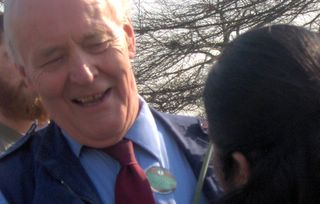
I saw Tony Benn, wondering about vaguely on his own before the march, screwing up his eyes, as we all were, against the strong sun, followed him to the front of the column and hung around taking pictures while he talked to the BBC and Al Jazeera. A strange thing to do. Immediately involving. I craned and pushed with the other photographers, surprised at myself. Then I thought, I’m a quiet person who stares. I saw him before all the media people. I might be quite good at this.

As we walked in the hot sun, I spent a long time stalking a woman with a multicoloured silk peace flag, hoping it would unfurl in a breeze. Thinking, here, between interesting buildings; not here, not enough light… it kept me there when all I needed to be was one more body on the street to be counted.

Hotter and hotter, London gets hot so quickly. Then, not long after we reached Trafalgar Square, the wind got up and it felt like March again. As if we’d been somewhere else.


It was the first time I’d taken photos at a demonstration. It made me notice more. Who was there. How they looked. What was odd. What was beautiful. Took my mind away from the physical experience of a vast crowd, which I don’t much like – so many people crushed together makes me panic a bit.

I saw Tony Benn, wondering about vaguely on his own before the march, screwing up his eyes, as we all were, against the strong sun, followed him to the front of the column and hung around taking pictures while he talked to the BBC and Al Jazeera. A strange thing to do. Immediately involving. I craned and pushed with the other photographers, surprised at myself. Then I thought, I’m a quiet person who stares. I saw him before all the media people. I might be quite good at this.

As we walked in the hot sun, I spent a long time stalking a woman with a multicoloured silk peace flag, hoping it would unfurl in a breeze. Thinking, here, between interesting buildings; not here, not enough light… it kept me there when all I needed to be was one more body on the street to be counted.

Hotter and hotter, London gets hot so quickly. Then, not long after we reached Trafalgar Square, the wind got up and it felt like March again. As if we’d been somewhere else.

Saturday, March 19, 2005
Two years on
On Wednesday it was Winter, Thursday and Friday were Spring, and today for London’s peace march we had Summer – the peaceniks were sweaty and footsore, but hugely energised. It felt big and solid and persistent.
Favourite placard (trimmed with the same bright fabric as her dress): WE DON’T HAVE TO FUCK EACH OTHER OVER TO SURVIVE.
Favourite chant:
IF YOU THINK THAT BLAIR’S A POODLE, GO WOOF WOOF!
All: WOOF! WOOF!
More of the march when I’ve downloaded my photos.
I heard on the radio the young soldier who’s been awarded the Victoria Cross – the first in 25 years – for risking his own life to save others in Iraq. He was saying those things that ordinary heroes say: ‘I didn’t think, just did what seemed obvious’… ‘He’s still a Private – not for long I suppose?’, the interviewer asked the army spokesman. Well, the spokesman said, with some embarrassment, he was still recovering from his terrible injuries and might not actually stay in the army. ‘Oh’, said the interviewer, a man renowned for having a great deal to say, ‘oh, um, I see’… There was a pause while he (and all the listeners, I suppose – this one certainly) swallowed hard - unimaginable horrors suddenly brought down to one man, whom we could imagine.
Walking home through the park after the demonstration: magnolia trees suddenly in flower and squirrels racing and the softest air, scoured clean by Winter.
Favourite placard (trimmed with the same bright fabric as her dress): WE DON’T HAVE TO FUCK EACH OTHER OVER TO SURVIVE.
Favourite chant:
IF YOU THINK THAT BLAIR’S A POODLE, GO WOOF WOOF!
All: WOOF! WOOF!
More of the march when I’ve downloaded my photos.
I heard on the radio the young soldier who’s been awarded the Victoria Cross – the first in 25 years – for risking his own life to save others in Iraq. He was saying those things that ordinary heroes say: ‘I didn’t think, just did what seemed obvious’… ‘He’s still a Private – not for long I suppose?’, the interviewer asked the army spokesman. Well, the spokesman said, with some embarrassment, he was still recovering from his terrible injuries and might not actually stay in the army. ‘Oh’, said the interviewer, a man renowned for having a great deal to say, ‘oh, um, I see’… There was a pause while he (and all the listeners, I suppose – this one certainly) swallowed hard - unimaginable horrors suddenly brought down to one man, whom we could imagine.
Walking home through the park after the demonstration: magnolia trees suddenly in flower and squirrels racing and the softest air, scoured clean by Winter.
Friday, March 18, 2005
Tents in Trafalgar Square
I’m especially glad of the warmer weather for the peace campaigners camping in Trafalgar Square this week, until the anti-war demonstration on Saturday.
I’m especially glad of the warmer weather for the peace campaigners camping in Trafalgar Square this week, until the anti-war demonstration on Saturday.
Thursday, March 17, 2005
Something happened
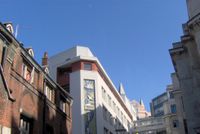
Woo… something happened overnight. The cold of winter and the cold in my head are in full retreat. Today is WARM.
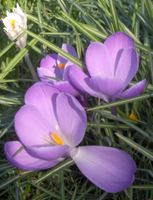
Taking the weather personally must be the ultimate hiding to nothing. Hard not to, though, when we’ve been waiting so long for Spring, while she stretches, clears her throat and goes back to bed for half an hour…
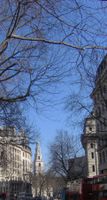
Click on the pix for larger size.

Woo… something happened overnight. The cold of winter and the cold in my head are in full retreat. Today is WARM.

Taking the weather personally must be the ultimate hiding to nothing. Hard not to, though, when we’ve been waiting so long for Spring, while she stretches, clears her throat and goes back to bed for half an hour…

Click on the pix for larger size.
Wednesday, March 16, 2005
Soothing symmetry
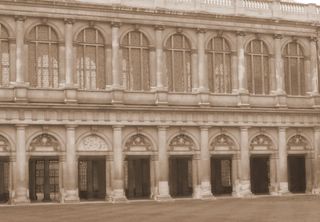
I took these photos of the Wren Library at Trinity College Cambridge on a freezing, rainy day a couple of weeks ago. Gazing at this fine, enduring, massive symmetry, I stopped feeling the cold and rain and my tangled nerve-endings were smoothed and soothed and made happy.
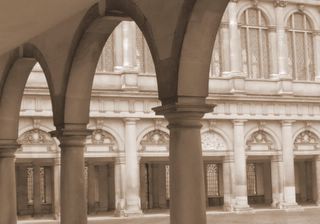
So I’m posting these today to soothe myself again. I have an awful cold – nose and throat and head on fire, stumbling through work, shaking hands nearly dropping my canteen lunch. Think solid, peaceful thoughts and beam them at the body, help it to restore itself to balance…
And the other thing that made me feel better: Augustine has interviewed God again! I think Natalie d’Arbeloff is totally brilliant. I don’t know why I didn’t know her work until I found her blog. I’m very glad I do now.

I took these photos of the Wren Library at Trinity College Cambridge on a freezing, rainy day a couple of weeks ago. Gazing at this fine, enduring, massive symmetry, I stopped feeling the cold and rain and my tangled nerve-endings were smoothed and soothed and made happy.

So I’m posting these today to soothe myself again. I have an awful cold – nose and throat and head on fire, stumbling through work, shaking hands nearly dropping my canteen lunch. Think solid, peaceful thoughts and beam them at the body, help it to restore itself to balance…
And the other thing that made me feel better: Augustine has interviewed God again! I think Natalie d’Arbeloff is totally brilliant. I don’t know why I didn’t know her work until I found her blog. I’m very glad I do now.
Tuesday, March 15, 2005
Thinking about CoHousing

I’ve been living on my own a long time. Longer than I ever meant to. I think a lot about the alternatives, which is what brought me, a year or so ago, to join a CoHousing group. Since then I’ve learned a huge amount about sustainable building materials and techniques, about UK legal, planning and financial norms, about developing and sustaining viable groups.
There’s a new British book on the subject, Thinking About CoHousing. It’s a good title, since in this country we’re mostly still at the stage of thinking about it. Just two groups of brave and persistent (and fairly affluent) CoHousers have built and occupied their communities.
The points made a few years ago by a resident of one of these, the Community Project near Lewes, Sussex, are all still valid. Since then, though, interest and knowledge have grown enormously. The first National Conference of the UK CoHousing Network, held at the end of February, drew nearly 100 enthusiasts: architects, solicitors, financiers, town planners and representatives of a dozen or so CoHousing planning groups from different parts of England, Scotland and Wales - some small groups and others, like this one with really ambitious plans. A participant describes the conference here.
As I noted right afterwards, it was a friendly, positive, but somewhat overwhelming event and, having heard from so many experts, I came away both wanting this even more and feeling even more daunted by the size of the task. Wanting a home where I know (and work with and eat with and share with) my neighbours almost more than anything, but not wanting to devote perhaps half of my time for the next four or five years to battling the prevailing UK planning, building and financial practices and expectations. And unless a good few people devote that much time and energy I don’t think it’s going to happen here on a wider and spreading scale.
What keeps me interested no matter what is reading things like this.
I’m proud of my ability to live alone, to be good company for myself. Happy that I’m happy to do most things on my own, unafraid to travel the world alone, to walk alone in the remotest countryside and late at night in the city. It’s a good thing for everyone sufficiently able-bodied to strive for self-reliance when required, I think. Only then do we truly appreciate company, are we truly good, strong, true companions. I believe, too, in mutual reliance, mutual support, but I think this only works when it’s freely chosen, when we have another choice.
So, yes, I’m glad of my hard-won ability to fend for myself. But I never meant it to become my whole way of life. Never meant to eat so many solitary meals, to close my front door so many times on just myself. Before I knew it, it became the norm – my norm and increasingly society’s. 20, 25 per cent of adults in the UK live alone, and that figure is increasing fast. Especially women, since we tend to live longer, ending up alone sooner or later anyway.
Is all this really inevitable? Really the only way? More and more of us at home in our single-person boxes? More and more of us taking our holidays alone, all our holidays, by choice? No, I don’t believe that, and I shall keep pursuing an alternative. When I first mentioned the CoHousing Conference here, I was startled to get an almost instant comment from one of the editors of the US CoHousing Magazine. This really gave me the feeling that we’re out there, a growing international network of people who want something different.

I’ve been living on my own a long time. Longer than I ever meant to. I think a lot about the alternatives, which is what brought me, a year or so ago, to join a CoHousing group. Since then I’ve learned a huge amount about sustainable building materials and techniques, about UK legal, planning and financial norms, about developing and sustaining viable groups.
There’s a new British book on the subject, Thinking About CoHousing. It’s a good title, since in this country we’re mostly still at the stage of thinking about it. Just two groups of brave and persistent (and fairly affluent) CoHousers have built and occupied their communities.
The points made a few years ago by a resident of one of these, the Community Project near Lewes, Sussex, are all still valid. Since then, though, interest and knowledge have grown enormously. The first National Conference of the UK CoHousing Network, held at the end of February, drew nearly 100 enthusiasts: architects, solicitors, financiers, town planners and representatives of a dozen or so CoHousing planning groups from different parts of England, Scotland and Wales - some small groups and others, like this one with really ambitious plans. A participant describes the conference here.
As I noted right afterwards, it was a friendly, positive, but somewhat overwhelming event and, having heard from so many experts, I came away both wanting this even more and feeling even more daunted by the size of the task. Wanting a home where I know (and work with and eat with and share with) my neighbours almost more than anything, but not wanting to devote perhaps half of my time for the next four or five years to battling the prevailing UK planning, building and financial practices and expectations. And unless a good few people devote that much time and energy I don’t think it’s going to happen here on a wider and spreading scale.
What keeps me interested no matter what is reading things like this.
I’m proud of my ability to live alone, to be good company for myself. Happy that I’m happy to do most things on my own, unafraid to travel the world alone, to walk alone in the remotest countryside and late at night in the city. It’s a good thing for everyone sufficiently able-bodied to strive for self-reliance when required, I think. Only then do we truly appreciate company, are we truly good, strong, true companions. I believe, too, in mutual reliance, mutual support, but I think this only works when it’s freely chosen, when we have another choice.
So, yes, I’m glad of my hard-won ability to fend for myself. But I never meant it to become my whole way of life. Never meant to eat so many solitary meals, to close my front door so many times on just myself. Before I knew it, it became the norm – my norm and increasingly society’s. 20, 25 per cent of adults in the UK live alone, and that figure is increasing fast. Especially women, since we tend to live longer, ending up alone sooner or later anyway.
Is all this really inevitable? Really the only way? More and more of us at home in our single-person boxes? More and more of us taking our holidays alone, all our holidays, by choice? No, I don’t believe that, and I shall keep pursuing an alternative. When I first mentioned the CoHousing Conference here, I was startled to get an almost instant comment from one of the editors of the US CoHousing Magazine. This really gave me the feeling that we’re out there, a growing international network of people who want something different.
Blogrolling
Does anyone know why I'm not receiving my login details from Blogrolling (I've tried four times)? Their support info suggests that this is because my email is blocking it as Spam - but my email doesn't block Spam, just diverts it to a Junk folder...
Unless someone has a suggestion, I guess I'll forget about Blogrolling and just create my own links list - shame though, I'd like to benefit from their other services.
Unless someone has a suggestion, I guess I'll forget about Blogrolling and just create my own links list - shame though, I'd like to benefit from their other services.
Monday, March 14, 2005
Cold crocuses

To make up for that last one, which doesn’t really add to the happiness quotient in cyberspace, here’s a view from Kew Gardens last weekend.
There were carpets of crocuses, but in the pale light and hunkered down as the tender flowers were, collars up against the icy wind, they almost looked like scatterings of mauve-tinted snow.
We’ve had some short bursts of warm sunshine in the past few days. As I unzipped my coat, took off my purple gloves and stretched out my pale fingers, I thought of the cold crocuses and hoped they were doing the same.

To make up for that last one, which doesn’t really add to the happiness quotient in cyberspace, here’s a view from Kew Gardens last weekend.
There were carpets of crocuses, but in the pale light and hunkered down as the tender flowers were, collars up against the icy wind, they almost looked like scatterings of mauve-tinted snow.
We’ve had some short bursts of warm sunshine in the past few days. As I unzipped my coat, took off my purple gloves and stretched out my pale fingers, I thought of the cold crocuses and hoped they were doing the same.
Sunday, March 13, 2005
Mobile worries
At the bus-stop, two boys of 13 or 14. They are sitting on a low front-garden wall, legs splayed, mobile phones held out in front of them at eye level.
They speak without looking at each other and without moving their lips.
- I got wun poun twenny six pee onnit.
- Twenny free pee, me. Sall I ever ave. Jussenuff fer wun teks.
Silence. Both brows furrow. They continue staring at the phones.
I wait for them to mention Godot.
They speak without looking at each other and without moving their lips.
- I got wun poun twenny six pee onnit.
- Twenny free pee, me. Sall I ever ave. Jussenuff fer wun teks.
Silence. Both brows furrow. They continue staring at the phones.
I wait for them to mention Godot.
Friday, March 11, 2005
Reading Lolita in Tehran

My girls spoke constantly of… the wind they had never felt on their skin.

Today I feel a little ashamed that all I could find to write about on International Women’s Day was my own youthful emotional travails in the women’s movement. I’m reading Reading Lolita in Tehran by Azar Nafisi, her memoir of the 1990s, when, having left her job as a university professor in Tehran, she invited a few of her best women students to a weekly study group in her home. They read and discussed banned Western novels, sharing out rare printed volumes and photocopied versions. F Scott Fitzgerald, Jane Austen, Nabokov. The girls took off their all-enveloping veils, revealing short hair, jeans and bright tee-shirts… and in time revealing much more, their lives and thoughts, their dreams and imaginings.
As you imagine us in that room, you must also understand our desire for this dangerous vanishing act. The more we withdrew into our sanctuary, the more we became alienated from our day-to-day life. When I walked down the streets, I asked myself, Are these my people, is this my hometown, am I who I am?
Fine writing, and gut-wrenching. In the chapter I’m reading, Nafisi describes how one of her students, Sanaz, was arrested for sitting in a private garden with a group of women-friends and the fiancé of one of them, kept in jail incommunicado for several days, subjected twice to ‘virginity testing’ and summarily sentenced to 25 lashes. Afterwards Sanaz drew a picture:
It is a simple drawing in black and white, of a naked girl, the white of her body caught in a black bubble. She is crouched in an almost fetal position, hugging one bent knee. Her other leg is stretched out behind her. Her long, straight hair follows the same curved line as the contour of her back, but her face is hidden. The bubble is lifted in the air by a giant bird with long black talons… the girl, the bubble and the girl’s hand that reached out of the bubble and holds on to the talon. Her subservient nakedness is dependent on that talon, and she reaches out.
Not simplistic. The complicity of victims is not denied. And although Nafisi certainly doesn’t make excuses for ‘Humbert’, she does look upon him with some understanding:
[Mr Bahri is student in Nafisi’s university class and ardent supporter of the revolutionary government]
As I got to know him better, I noticed he was not as arrogant as I had thought him to be. Or perhaps I grew more accustomed to his special kind of arrogance, that of a naturally shy and reserved young man who had discovered an absolutist refuge... It was his doggedness, his newfound certainty, that gave him this arrogance. At times he could be very gentle, and when he talked, he would not look you in the eyes – not just because a Muslim man should not look a woman in the eyes, but because he was too timid. It was this mixture of arrogance and shyness that aroused my curiosity.
What will stay with me most, though, is one sentence – the one that walks through my mind every time I see a completely veiled woman in London, right next to the women with bare midriffs and thongs deliberately visible above their jeans
As you imagine us in that room, you must also understand our desire for this dangerous vanishing act. The more we withdrew into our sanctuary, the more we became alienated from our day-to-day life. When I walked down the streets, I asked myself, Are these my people, is this my hometown, am I who I am?
Fine writing, and gut-wrenching. In the chapter I’m reading, Nafisi describes how one of her students, Sanaz, was arrested for sitting in a private garden with a group of women-friends and the fiancé of one of them, kept in jail incommunicado for several days, subjected twice to ‘virginity testing’ and summarily sentenced to 25 lashes. Afterwards Sanaz drew a picture:
It is a simple drawing in black and white, of a naked girl, the white of her body caught in a black bubble. She is crouched in an almost fetal position, hugging one bent knee. Her other leg is stretched out behind her. Her long, straight hair follows the same curved line as the contour of her back, but her face is hidden. The bubble is lifted in the air by a giant bird with long black talons… the girl, the bubble and the girl’s hand that reached out of the bubble and holds on to the talon. Her subservient nakedness is dependent on that talon, and she reaches out.
Not simplistic. The complicity of victims is not denied. And although Nafisi certainly doesn’t make excuses for ‘Humbert’, she does look upon him with some understanding:
[Mr Bahri is student in Nafisi’s university class and ardent supporter of the revolutionary government]
As I got to know him better, I noticed he was not as arrogant as I had thought him to be. Or perhaps I grew more accustomed to his special kind of arrogance, that of a naturally shy and reserved young man who had discovered an absolutist refuge... It was his doggedness, his newfound certainty, that gave him this arrogance. At times he could be very gentle, and when he talked, he would not look you in the eyes – not just because a Muslim man should not look a woman in the eyes, but because he was too timid. It was this mixture of arrogance and shyness that aroused my curiosity.
What will stay with me most, though, is one sentence – the one that walks through my mind every time I see a completely veiled woman in London, right next to the women with bare midriffs and thongs deliberately visible above their jeans
My girls spoke constantly of… the wind they had never felt on their skin.
Wednesday, March 09, 2005
Orchid meditation

Breathe in
breathe out
remember the heat
remember the smell
count the petals
for each squashed, angry person on the bus: one petal
each paper on the desk: one petal
each e-mail in the in-box: one petal
each reminder in the diary: one petal
breathe

Breathe in
breathe out
remember the heat
remember the smell
count the petals
for each squashed, angry person on the bus: one petal
each paper on the desk: one petal
each e-mail in the in-box: one petal
each reminder in the diary: one petal
breathe
Tuesday, March 08, 2005
International Women's Day

A friend sent me this picture as an e-card for International Women’s Day – such a bright, unexpected thing amongst my office e-mails. I’d forgotten it was today, which is astonishing, as I used to work for an international women’s organisation and this was a big deal.
In a later job, our Director once decided to send all the women home at lunchtime on 8 March. Really bad idea. It created so much bad feeling among male colleagues. The sex war raged virulently across the office for weeks – so much suppressed anger coming out, it was quite an eye-opener.
I don’t know if it’s just a coincidence that yesterday and today a fairly heavy discussion has been happening at Time Goes By on how we old-time 1970s feminists see things now. It was a good discussion, honest and not vindictive, heartening really.
My life was torn apart in the late 1970s when all my friends in the women’s movement offered me an option: them or the man I loved. It’s a scar I’ll always bear. I ended up with none of them, left and moved, alone, to another city. I probably only began really to recover when I came, in the last few years, to Buddhist teachings which deeply challenge the perceived boundaries between self and other. And yet, and yet, I can’t imagine my heartfelt identification with feminism ever changing.

A friend sent me this picture as an e-card for International Women’s Day – such a bright, unexpected thing amongst my office e-mails. I’d forgotten it was today, which is astonishing, as I used to work for an international women’s organisation and this was a big deal.
In a later job, our Director once decided to send all the women home at lunchtime on 8 March. Really bad idea. It created so much bad feeling among male colleagues. The sex war raged virulently across the office for weeks – so much suppressed anger coming out, it was quite an eye-opener.
I don’t know if it’s just a coincidence that yesterday and today a fairly heavy discussion has been happening at Time Goes By on how we old-time 1970s feminists see things now. It was a good discussion, honest and not vindictive, heartening really.
My life was torn apart in the late 1970s when all my friends in the women’s movement offered me an option: them or the man I loved. It’s a scar I’ll always bear. I ended up with none of them, left and moved, alone, to another city. I probably only began really to recover when I came, in the last few years, to Buddhist teachings which deeply challenge the perceived boundaries between self and other. And yet, and yet, I can’t imagine my heartfelt identification with feminism ever changing.
Monday, March 07, 2005
Orchids

On a perishing cold day, through the crowds going to rugby at Twickenham (Northern Hemisphere vs Southern Hemisphere charity match for Tsunami aid – the Southern Hemisphere won), to the Orchid Festival in Kew Gardens (http://www.rbgkew.org.uk/).
Across the chilly lawns to a big, hot glasshouse stuffed with flowery abundance. Odd and artificial. But gorgeous. Inside, everyone goes warm and squishy, expanding in the heat, turning soft and velvety as petals, sozzled on the scent, smiling silent sorries as we step back to stare and bump bottoms.
So much pleasure. So many cameras out. We’ll all be living on this until the Spring comes.

On a perishing cold day, through the crowds going to rugby at Twickenham (Northern Hemisphere vs Southern Hemisphere charity match for Tsunami aid – the Southern Hemisphere won), to the Orchid Festival in Kew Gardens (http://www.rbgkew.org.uk/).
Across the chilly lawns to a big, hot glasshouse stuffed with flowery abundance. Odd and artificial. But gorgeous. Inside, everyone goes warm and squishy, expanding in the heat, turning soft and velvety as petals, sozzled on the scent, smiling silent sorries as we step back to stare and bump bottoms.
So much pleasure. So many cameras out. We’ll all be living on this until the Spring comes.
Friday, March 04, 2005
Orpheus in the underpass
It was tempting fate to say I wanted to look up and note the good things, make my peace a little with my surroundings. Wednesday evening brought relentless diagonal curtains of what one of my blogging heroes called snizzle (http://www.oldgreypoet.com/2005/200503/20050302.html); battered people, heads down, colliding damply.
I took refuge in the underpass, and straight away felt more alive because there, carved all along the smelly wall from Waterloo Station to Waterloo Bridge, is the poem, Eurydice – public art which works, for once, miraculously well.
I am not afraid as I descend,
step by step, leaving behind the salt wind
blowing up the corrugated river,
My eyes meet those of the young homeless man and his dog, ensconced in their grimy bedding right below these lines.
the damp city streets, their sodium glare
of rush-hour headlights pitted with pearls of rain;
for my eyes still reflect the half remembered moon
Why does the underpass look flat but feel like walking up a long hill?
This path unravels.
Deep in hidden rooms filled with dust
and sour night-breath the lost city is sleeping
When I first saw the poem, I would read it each time I trudged past, muttering it over to myself until I had most of it by heart, the damp walls dissolving into story, blank routine into imagination.
Soon, soon I will climb
from this blackened earth
into the diffident light
and up onto the bridge, wide views of the Thames.
I took refuge in the underpass, and straight away felt more alive because there, carved all along the smelly wall from Waterloo Station to Waterloo Bridge, is the poem, Eurydice – public art which works, for once, miraculously well.
I am not afraid as I descend,
step by step, leaving behind the salt wind
blowing up the corrugated river,
My eyes meet those of the young homeless man and his dog, ensconced in their grimy bedding right below these lines.
the damp city streets, their sodium glare
of rush-hour headlights pitted with pearls of rain;
for my eyes still reflect the half remembered moon
Why does the underpass look flat but feel like walking up a long hill?
This path unravels.
Deep in hidden rooms filled with dust
and sour night-breath the lost city is sleeping
When I first saw the poem, I would read it each time I trudged past, muttering it over to myself until I had most of it by heart, the damp walls dissolving into story, blank routine into imagination.
Soon, soon I will climb
from this blackened earth
into the diffident light
and up onto the bridge, wide views of the Thames.
The whole poem, by Sue Hubbard is at: http://downlode.org/etext/lostcity.html
Here’s a much more atmospheric photo (but the photographer apparently didn’t notice it was a poem): http://www.scottwishart.co.uk/weblog/2004/08/type-on-walls-of-waterloo-underpass.html
and here, in the impressive photo blog, Curiously Incongruous, are some pictures of what lies at either end of the underpass: http://sqs.blogs.com/curiously_incongruous/waterloo/index.html
Here’s a much more atmospheric photo (but the photographer apparently didn’t notice it was a poem): http://www.scottwishart.co.uk/weblog/2004/08/type-on-walls-of-waterloo-underpass.html
and here, in the impressive photo blog, Curiously Incongruous, are some pictures of what lies at either end of the underpass: http://sqs.blogs.com/curiously_incongruous/waterloo/index.html
Thursday, March 03, 2005
Blogging can be a tool...
Today I’ve read some words about 'what it's about' that will stay in my mind for a good while.
Julie Leung in the US Pacific North West wrote at the end of a long entry about blogging and parenting: Blogging can be a tool: If we are willing to share, if we are willing to open ourselves, to be examples, to change our lives, to live in front of each other, to ask questions and reveal distresses, we can help each other find freedom.
More at: http://www.julieleung.com/archives/001700.html
And Andy Borrows in Hertfordshire, near London, England, shared the piece he’s written for the forthcoming ‘100 Bloggers’ book:(http://jstrande.typepad.com/blog/100_bloggers/index.html). I can’t imagine a more eloquent summation of one man and why he writes a blog: …quite by chance, I came across blogging. I sensed something good going on, something worth being a part of – a community of “good hearts and good minds” as another blogger later put it. I felt a sense of attraction - excitement even - as, in the people I encountered, I recognised reflections of that lost soul I’d left marooned…. My blogging continues to be an exploration into the un-sailed waters of what lies within, in the company of good hearts and good minds. Sometimes scary, sometimes battling against inner resistance, often with surprising, insightful discoveries.
More at: http://olderandgrowing.blogspot.com/2005/03/good-hearts-good-minds-blogging-as.html
Julie Leung in the US Pacific North West wrote at the end of a long entry about blogging and parenting: Blogging can be a tool: If we are willing to share, if we are willing to open ourselves, to be examples, to change our lives, to live in front of each other, to ask questions and reveal distresses, we can help each other find freedom.
More at: http://www.julieleung.com/archives/001700.html
And Andy Borrows in Hertfordshire, near London, England, shared the piece he’s written for the forthcoming ‘100 Bloggers’ book:(http://jstrande.typepad.com/blog/100_bloggers/index.html). I can’t imagine a more eloquent summation of one man and why he writes a blog: …quite by chance, I came across blogging. I sensed something good going on, something worth being a part of – a community of “good hearts and good minds” as another blogger later put it. I felt a sense of attraction - excitement even - as, in the people I encountered, I recognised reflections of that lost soul I’d left marooned…. My blogging continues to be an exploration into the un-sailed waters of what lies within, in the company of good hearts and good minds. Sometimes scary, sometimes battling against inner resistance, often with surprising, insightful discoveries.
More at: http://olderandgrowing.blogspot.com/2005/03/good-hearts-good-minds-blogging-as.html
Wednesday, March 02, 2005
The one about what it's about

Two weeks old. I started this on a whim, having thought – well, I could, I might; no, I couldn’t, I have no theme. On a whim. No plan. Letting my fingers go where they would. And where they went was all over the place, visiting the news, the weather, the past, odd thoughts and things that link or anchor or define me, I suppose.
Truly, though, I often feel unlinked, unanchored and without identity. No partner, no children, no contact with my birth family. A job that doesn’t engage me. Great love for friends, but great reticence too – a determination not to be too needy, not to want more than they, in their busy lives, can give. Unconstrained passion and connection only for language, art… and place.
Always, love affairs with places. But for years now the place I’m in has felt like my enemy – a violent relationship. For years I’ve been going about my daily business shut down, eyes half-closed, clenched against the dirt and chaos, the overcrowding and aggression of London. Hating it, but unable to summon the courage or the energy to leave.
I can see my way to leaving, finally, and soon I will. But before I go I’d like to open my eyes a bit, notice and record something of what’s strange and touching and impressive in the city, make my peace with it. Maybe I can do that here.

Two weeks old. I started this on a whim, having thought – well, I could, I might; no, I couldn’t, I have no theme. On a whim. No plan. Letting my fingers go where they would. And where they went was all over the place, visiting the news, the weather, the past, odd thoughts and things that link or anchor or define me, I suppose.
Truly, though, I often feel unlinked, unanchored and without identity. No partner, no children, no contact with my birth family. A job that doesn’t engage me. Great love for friends, but great reticence too – a determination not to be too needy, not to want more than they, in their busy lives, can give. Unconstrained passion and connection only for language, art… and place.
Always, love affairs with places. But for years now the place I’m in has felt like my enemy – a violent relationship. For years I’ve been going about my daily business shut down, eyes half-closed, clenched against the dirt and chaos, the overcrowding and aggression of London. Hating it, but unable to summon the courage or the energy to leave.
I can see my way to leaving, finally, and soon I will. But before I go I’d like to open my eyes a bit, notice and record something of what’s strange and touching and impressive in the city, make my peace with it. Maybe I can do that here.
Tuesday, March 01, 2005
The Oxford Muse
I came upon The Oxford Muse ( http://www.oxfordmuse.com/ ) a few months ago, just at the time I was starting to read blogs and fast getting hooked. It appealed to me for some of the same reasons.
I’d read and loved a wonderful, chaotic book called An Intimate History of Humanity, by the project’s founder, Oxford Professor Theodore Zeldin – a “history of human feelings, habits, emotions and perceptions” which alternates historical essays with illustrative contemporary personal accounts of each emotion discussed (http://www.amazon.co.uk/exec/obidos/ASIN/0749396237/026-2718031-2203616#product-details )
The book appealed to my curiosity (or you could call it voyeurism) about people’s intimate lives and how they talk about them. You could call it voyeurism when reading a book - sometimes even when reading a blog. But the Oxford Muse is all about exchange, initiating conversations, challenging the superficiality of much social contact.
They ask people to write their self-portraits, or create them in discussion with Muse facilitators. Questions are provided (but answering these is optional) to provoke reflection and self-revelation. The results are interesting. Some of these portraits are on the website, and a book is in press.
Other activities include ‘conversation dinners’, where strangers or people who’ve previously known one another only in a restricted context are placed at tables for two and given a ‘menu’ of personal questions to discuss. A recent participant said he learned more about a colleague over this dinner than during 20 years working in the same office.
There’s an e-group with world-wide membership which, at its best, creates a real feeling of connection and of people sparking off each other’s thoughts and emotions.
Zeldin’s recent radio appearances have been arousing interest. He’s on the BBC World Service this week – listen here at any time until Monday 7 February: http://www.bbc.co.uk/worldservice/programmes/masterpiece.shtml
I’d read and loved a wonderful, chaotic book called An Intimate History of Humanity, by the project’s founder, Oxford Professor Theodore Zeldin – a “history of human feelings, habits, emotions and perceptions” which alternates historical essays with illustrative contemporary personal accounts of each emotion discussed (http://www.amazon.co.uk/exec/obidos/ASIN/0749396237/026-2718031-2203616#product-details )
The book appealed to my curiosity (or you could call it voyeurism) about people’s intimate lives and how they talk about them. You could call it voyeurism when reading a book - sometimes even when reading a blog. But the Oxford Muse is all about exchange, initiating conversations, challenging the superficiality of much social contact.
They ask people to write their self-portraits, or create them in discussion with Muse facilitators. Questions are provided (but answering these is optional) to provoke reflection and self-revelation. The results are interesting. Some of these portraits are on the website, and a book is in press.
Other activities include ‘conversation dinners’, where strangers or people who’ve previously known one another only in a restricted context are placed at tables for two and given a ‘menu’ of personal questions to discuss. A recent participant said he learned more about a colleague over this dinner than during 20 years working in the same office.
There’s an e-group with world-wide membership which, at its best, creates a real feeling of connection and of people sparking off each other’s thoughts and emotions.
Zeldin’s recent radio appearances have been arousing interest. He’s on the BBC World Service this week – listen here at any time until Monday 7 February: http://www.bbc.co.uk/worldservice/programmes/masterpiece.shtml




